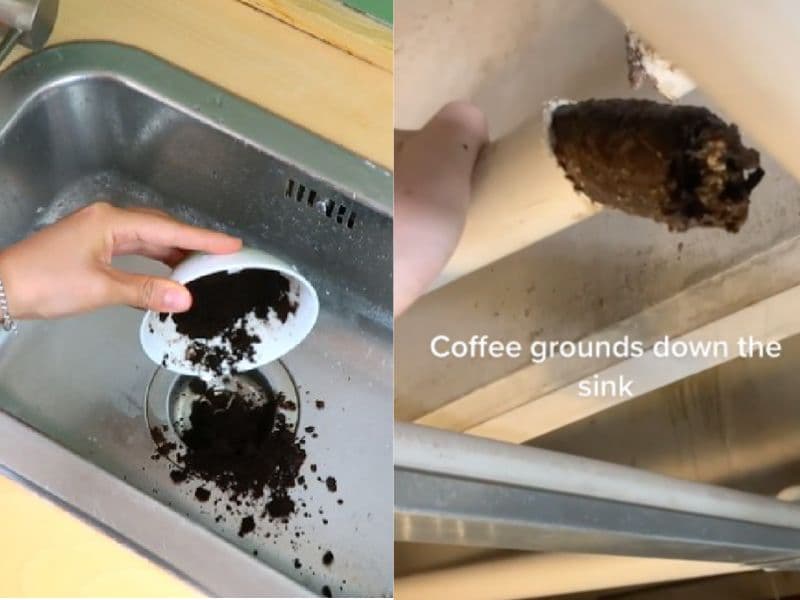Have you ever heard that pouring coffee grounds down the drain can clean it or make it smell better? Avoid falling into the myth! It would be best if you don’t use a garburator like a garbage can.
Take it from the plumbing pros: resist the desire to pour coffee grounds down the drain unless you want to deal with significant clogs. Remove them from a clogged sink with chemical cleaners, a plunger, or a sink snake. Besides coffee grounds, avoid putting eggshells, oils, and combustibles down the sink drain.
With the right sink drain height from the floor, you can unclog a sink being removing the parts under the sink when the methods suggested above don’t work.

Can you put coffee grounds down the sink?
While it may seem logical to dump your coffee grounds down the sink, doing so is unsafe and will probably cause your drain to become clogged.
One of the causes of drain clogs, particularly in the kitchen, is coffee grounds. When moist, grinds can collect in the drain pipe of your kitchen sink and stick to the accumulated curdled grease and other organic materials.
Coffee grounds don’t break down and instead build up and become part of the drainage sludge, not decomposing. Therefore, frequently dumping coffee grounds in your sink will eventually result in a blocked drain, which, if ignored, will cost you a lot of money.
Coffee grounds can significantly cause kitchen drain clogs, despite not being the primary factor. Fatty substances go down the drain when you rinse your dishes.
Grease thickens and sticks to the pipes’ walls, building up over time. Even after flushing with lots of water, the coffee grounds in your sink stick to the sludge accumulation.
That’s why throwing your coffee grounds in your sink is unsafe. They may cause your drain to slow down or eventually clog.
I put coffee grounds in the sink; what should I do?
If you have been disposing of your coffee grounds in your sink, you should stop immediately. It could lead to severe difficulties and eventually plug up your drain.
The good news is that, depending on the severity of the obstruction, unclogging your drain can be a simple procedure you can complete on your own without calling a plumber.
How to remove coffee grounds from a sink
Some of the methods to use when your sink is clogged with coffee grounds include:
1. Chemical drain cleaners and liquid decloggers
Many homeowners use store-bought items like liquid declogging treatments and chemical drain cleaners like Drano to unclog sinks when they become clogged. However, there’s no question about how effective drain cleaners are.
2. Plunger
A plunger will be your best friend if you only need a temporary solution and the clog isn’t the result of significant grease buildup.
3. Sink Snake
You can also use a drain snake to unclog the obstructions in your sink if you prefer a more hands-on method of unclogging your clogged drain. Like a shower snake, a sink snake may refuse to go down the drain if there’s a bigger clog which requires other unclogging methods.
4. Plumber
When all else fails, it’s time to request assistance. A plumber is prepared with the knowledge to unclog your drain swiftly and remove any buildup caught in your sink drain.
They can cost you money, but they can swiftly treat your sink’s problem and advise you on what to toss and not throw in it.
If any of these methods damges the sink, you can easily repair it the same way you repair a scratched toilet bowl.
How to dispose of coffee grounds
What should you do with them if you can’t flush coffee grounds down the drain? Of course, you could toss them in the trash, but we urge you to try these practical uses for them instead!
- You can use coffee grounds to help fertilize your garden because they contain essential elements for plant growth. Coffee grounds can be used as fertilizer by being sprinkled on your plants.
- In addition to fertilizing plants due to their high mineral content, coffee grounds are excellent in absorbing pollutants from the soil, especially heavy metals.
- It is also said coffee grounds draw worms, which are beneficial to gardens. Your used coffee grounds can be composted and used later.
- When you put coffee grounds in bowls or scatter them around where you want to repel insects, they work incredibly well as insect repellents.
- Simply bathe your dog or cat, then brush coffee grounds into their fur to eliminate fleas. And then, as normal, rinse them out and dry them.
- Used coffee grounds work similarly to baking soda in removing odors. They can do the work if you put them in a bowl in the refrigerator!
- For a lovely face or body scrub or to help lessen the appearance of cellulite, you can mix coffee grounds with coconut oil.
What else can’t I put down in the sink?
Grease and oils shouldn’t be washed down the drain. Considering that you’ll likely have them when you cook, you’ll have to fight the impulse to wash the oil, fat, and grease from your cooking utensils and gadgets into the drain. Inside your plumbing, these substances can crust and harden, clogging pipes.
While this may seem obvious, you’ll also want to refrain from washing anything radioactive or combustible down the drain.
Eggshells are a popular item put into the waste; keep this out. They may crumble into minute granules and combine with substances like grease and oil. When this happens, it can produce obstructions in the drain.
Ensure you avoid paint, medication, car fluids, and cleaning products.
Conclusion
It is, therefore, safe to conclude that the idea that coffee grounds can unclog your sink drains is untrue. Please avoid attempting this at home.
